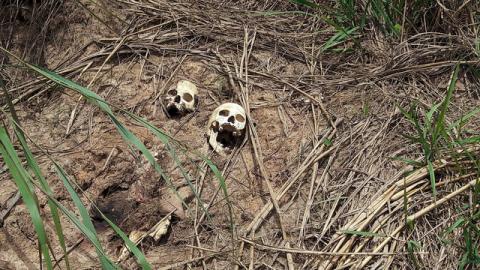Advertisement
Bodies of two U.N. investigators found in Congo - government
ABIDJAN (Reuters) - Villagers in Democratic Republic of Congo discovered the remains of two U.N. investigators and their Congolese interpreter who went missing this month in an area engulfed in a violent uprising, a government spokesman said on Tuesday.
Michael Sharp, a U.S. citizen, and Zaida Catalan, a Swedish national, had been in a group of experts monitoring a sanctions regime imposed on Congo by the U.N. Security Council when they disappeared in Kasai Central province.
In a statement issued in New York, U.N. Secretary-General Antonio Guterres confirmed that the remains of the two investigators missing since March 12 had been found in Congo and said the world body would conduct an inquiry.
Villagers found the bodies of two Caucasians and one Congolese not far from where the experts group vanished, according to the government.
Police informed the authorities in the capital Kinshasa on Monday and a team including the provincial police commissioner was sent to the scene to identify the bodies.
"It's now a certainty. It is the two investigators. We identified the third body in the grave with them as their Congolese interpreter," Communications Minister Lambert Mende told Reuters.
John Sharp, the father of Michael, posted on his Facebook page that the bodies of two Caucasians had been found in a shallow grave, saying that there was a "high probability" that it was the U.N. officials.
"This is a message I hoped never to write," he wrote, adding that DNA tests and dental records would be used to confirm the identities of the bodies.
Guterres said the United Nations would cooperate with Congolese authorities in searching for the four Congolese nationals who accompanied the U.N. officials.
"In case of criminal acts, the United Nations will do everything possible to ensure that justice is done," the U.N. chief said.
The Swedish Foreign Ministry said it would not comment on the incident as it was being handled by the United Nations.
Congo's Kasai Central region is the epicentre of the Kamuina Nsapu insurgency that has now spread to five provinces in the loosely governed Central African country.
The Kinshasa government said earlier this month the two U.N. officials had fallen into the hands of unidentified "negative forces" along with four Congolese who were with them near the village of Ngombe in Kasai Central.
"Going to places where few people go, asking questions that few people ask, finding out the truth, this is the work of United Nations experts," said Emilie Serralta, a former coordinator of the U.N. Congo group. "This is how the reports and recommendations (guiding) the Security Council are written."
Kamuina Nsapu militants pose an increasingly serious threat to President Joseph Kabila, whose decision to stay on beyond the end of his elected mandate last December has sent ripples of unrest across the vast mining powerhouse.
U.N. figures indicate that over 400 people have been killed in violence in which militants have been blamed for atrocities and government forces are accused of targeting civilians.
Local officials said on Saturday militiamen decapitated about 40 police officers in the deadliest attack on the security forces since the uprising began last year.
(Additional reporting by Aaron Ross in Kinshasa, Michelle Nichols at the United Nations and Johan Ahlander in Stockholm; Editing by Edward McAllister, Mark Heinrich, Toni Reinhold)



















Add new comment